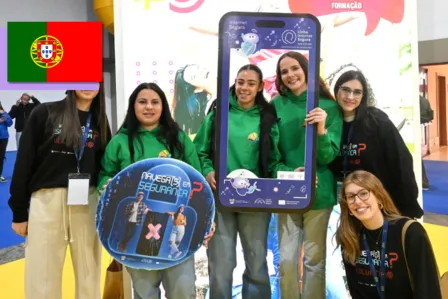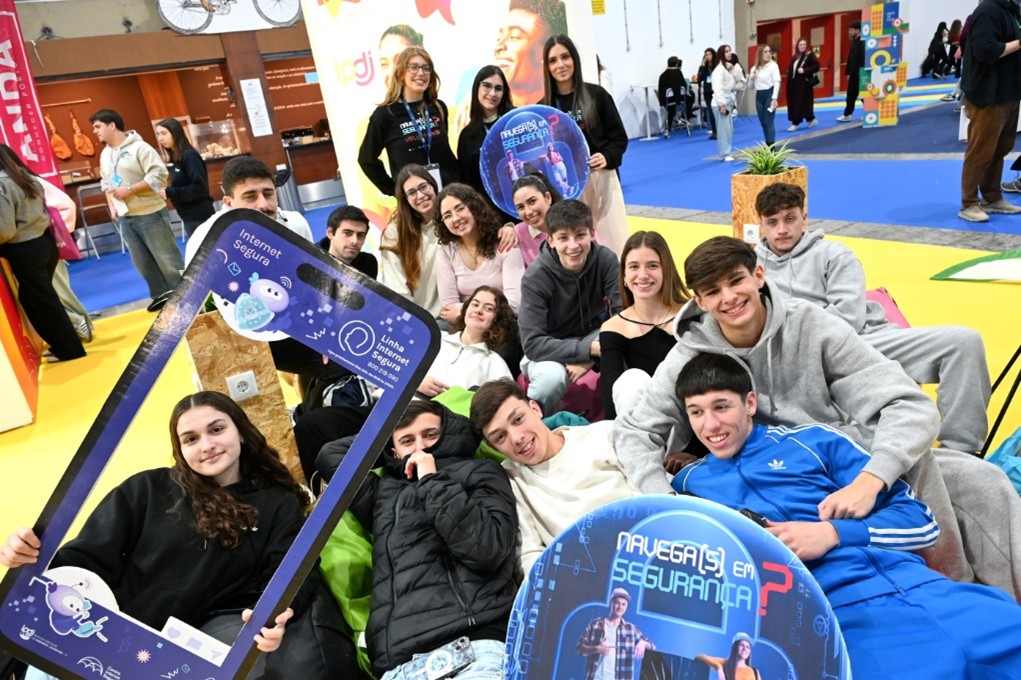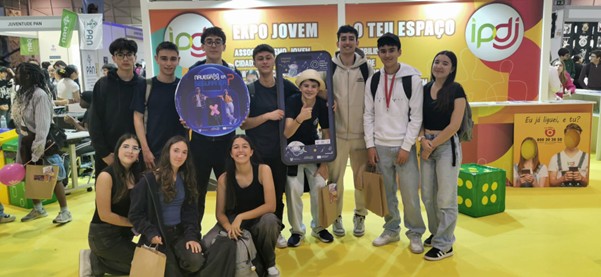The Portuguese Institute of Sport and Youth (IPDJ), part of the Portuguese Safer Internet Centre, participated in the two largest education, training, and youth-centred fairs in Portugal: Qualifica (12-15 March 2025) at Exponor in Oporto, and Futurália (26-29 March 2025) at the Lisbon International Fair (FIL).

This year, Futurália’s theme was “AI in education”, while Qualifica focused on “Lifelong Learning”.
At the IPDJ booth, various programmes and initiatives were promoted to address the specific needs of young people, covering a wide range of interests, including non-formal education, training, youth health, and international mobility. Special attention was given to digital citizenship and online safety.

Young visitors could explore different areas of interest at dedicated information desks. In particular, regarding safer iInternet and digital citizenship, young volunteers from the “Navega(s) em Segurança?” programme provided peer-to-peer information and guidance, while collaborating with youth information workers. They shared details about the programme, including how to become an IPDJ volunteer in this field, and how to request safer internet awareness sessions across the country.
Additionally, information was provided on key topics such as:
- Young people and AI
- Disinformation in the digital age (fake news, clickbait, filter bubbles, and echo chambers…)
- Hate speech and online safety (privacy, app permissions, geolocation risks…)
- Healthy online behaviour (preventing excessive internet use)
- Online relationships and associated risks (sexting, grooming, coercion, and online sexual extortion)
- Cyberbullying
- Online gaming and gambling
- Information about the European Year of Digital Citizenship Education.

In total, approximately 100,000 young people attended the two fairs in Oporto and Lisbon. The IPDJ booths welcomed around 25,000 visitors, reinforcing the institute’s commitment to fostering digital awareness and youth empowerment.

Further information about the Portuguese Safer Internet Centre can be found on the Better Internet for Kids (BIK) public portal, including links to its national websites and other contact information. Similar information can be found on the BIK portal for all Safer Internet Centres in Europe.
The Portuguese Institute of Sport and Youth (IPDJ), part of the Portuguese Safer Internet Centre, participated in the two largest education, training, and youth-centred fairs in Portugal: Qualifica (12-15 March 2025) at Exponor in Oporto, and Futurália (26-29 March 2025) at the Lisbon International Fair (FIL).

This year, Futurália’s theme was “AI in education”, while Qualifica focused on “Lifelong Learning”.
At the IPDJ booth, various programmes and initiatives were promoted to address the specific needs of young people, covering a wide range of interests, including non-formal education, training, youth health, and international mobility. Special attention was given to digital citizenship and online safety.

Young visitors could explore different areas of interest at dedicated information desks. In particular, regarding safer iInternet and digital citizenship, young volunteers from the “Navega(s) em Segurança?” programme provided peer-to-peer information and guidance, while collaborating with youth information workers. They shared details about the programme, including how to become an IPDJ volunteer in this field, and how to request safer internet awareness sessions across the country.
Additionally, information was provided on key topics such as:
- Young people and AI
- Disinformation in the digital age (fake news, clickbait, filter bubbles, and echo chambers…)
- Hate speech and online safety (privacy, app permissions, geolocation risks…)
- Healthy online behaviour (preventing excessive internet use)
- Online relationships and associated risks (sexting, grooming, coercion, and online sexual extortion)
- Cyberbullying
- Online gaming and gambling
- Information about the European Year of Digital Citizenship Education.

In total, approximately 100,000 young people attended the two fairs in Oporto and Lisbon. The IPDJ booths welcomed around 25,000 visitors, reinforcing the institute’s commitment to fostering digital awareness and youth empowerment.

Further information about the Portuguese Safer Internet Centre can be found on the Better Internet for Kids (BIK) public portal, including links to its national websites and other contact information. Similar information can be found on the BIK portal for all Safer Internet Centres in Europe.
- digital citizenship digital literacy digital skills
Related content
- < Previous article
- Next article >












